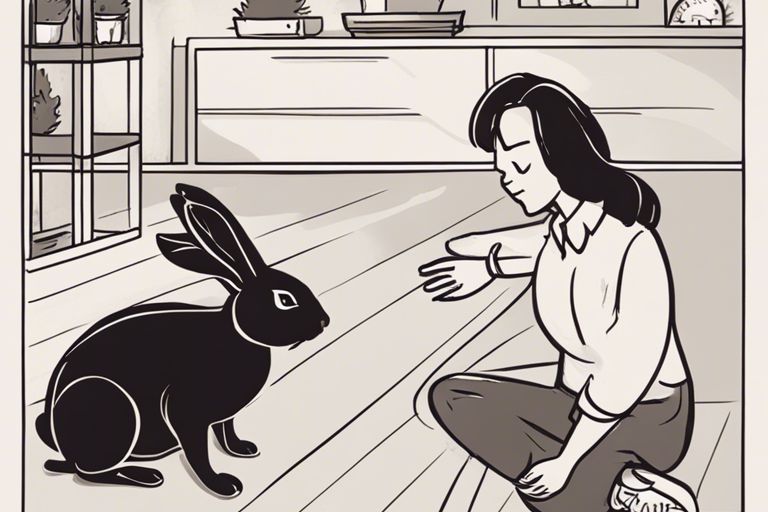If your rabbit is displaying aggressive behavior, there are several steps you can take to address the issue and improve the situation. Aggression in rabbits can pose a danger to both you and your pet, so it’s important to address the problem promptly and effectively. In this blog post, we will discuss common causes of aggressive behavior in rabbits and provide strategies for dealing with aggression in your pet.
Causes of Aggression in Rabbits
By understanding the underlying causes of aggressive behavior in rabbits, you can better manage and prevent conflict in your home. Aggression in rabbits can stem from a variety of reasons, including territorial instincts, hormonal influences, and fear or stress. Identifying the specific cause of aggression in your rabbit is essential for developing an effective strategy for behavior modification.
Territorial Instincts
Rabbits are naturally territorial animals, and they may become aggressive when they feel their space is being invaded. This can occur when introducing a new rabbit into the household or when your rabbit feels threatened by changes in their environment. Signs of territorial aggression may include lunging, circling, or aggressive displays towards other rabbits or even humans. It’s important to establish your rabbit’s territory and provide them with a safe and secure environment to help reduce their territorial behavior.
Hormonal Influences
Hormonal influences, particularly in intact (non-neutered or non-spayed) rabbits, can also contribute to aggressive behavior. Unaltered rabbits may exhibit territorial aggression, fighting with other rabbits, or aggressive mating behavior. Additionally, female rabbits can become more aggressive during their reproductive cycle. Neutering and spaying can significantly reduce hormone-driven aggression in rabbits, as well as provide numerous health benefits for your pet. If you notice aggressive behavior in your rabbit, consult with your veterinarian about the potential benefits of spaying or neutering.
Understanding the various causes of aggression in rabbits is crucial in effectively addressing and managing your rabbit’s behavior. A combination of environmental management, behavioral modification, and, in some cases, veterinary intervention can help mitigate aggressive tendencies and promote a harmonious living environment for you and your pet. If you are unsure of the cause of aggression in your rabbit, seek guidance from a knowledgeable veterinarian or animal behaviorist. Remember, addressing aggressive behavior in rabbits promptly is essential for their well-being and the safety of those around them.
Preventing Aggressive Behavior
If you are looking to prevent aggressive behavior in your rabbits, there are a few key strategies you can employ. By focusing on proper socialization techniques and creating a safe and enriching environment, you can help keep your rabbits happy and peaceful.
Proper Socialization Techniques
When it comes to preventing aggressive behavior in rabbits, proper socialization is crucial. **Introducing rabbits to each other slowly and in a neutral environment** can help minimize the risk of conflicts. Make sure to supervise their interactions and be prepared to separate them if necessary. **Additionally, spending time with your rabbits, handling them gently and speaking to them in a calm and reassuring manner** can help build their trust and reduce their stress levels, which in turn can lower the likelihood of aggressive behavior.
Creating a Safe and Enriching Environment
Another important aspect of preventing aggressive behavior in rabbits is creating a safe and enriching environment for them. **Ensuring that your rabbits have enough space to move around and exercise, as well as access to hiding spots and toys, can help reduce stress and prevent boredom**, which are common triggers for aggressive behavior in rabbits. **Providing them with a balanced diet and enrichment activities such as puzzle feeders and tunnels** can also keep them mentally stimulated and content, helping to minimize the risk of aggression.
Managing and Correcting Aggression
Despite your best efforts to prevent it, you may find yourself faced with aggressive behavior in your rabbit. It’s important to handle this behavior in a responsible and effective manner to ensure the safety and well-being of both your rabbit and yourself. Here are some strategies for managing and correcting aggression in rabbits.
Behavioral Modification Strategies
When it comes to addressing aggressive behavior in rabbits, it’s important to first identify the triggers that may be causing the aggression. Is your rabbit feeling threatened, or is there a specific situation or interaction that is causing the aggressive response? Once you understand the underlying cause, you can begin to work on behavior modification strategies. Positive reinforcement techniques can be effective in redirecting aggressive tendencies, such as rewarding calm and non-aggressive behavior with treats or praise. Additionally, providing enrichment activities and a safe, comfortable environment for your rabbit can help reduce stress and prevent aggressive behavior.
Professional Intervention and Support
If you are struggling to manage your rabbit’s aggressive behavior on your own, seeking professional intervention and support may be necessary. A certified animal behaviorist or experienced rabbit veterinarian can provide valuable insight and guidance in addressing aggressive behavior. They can help you develop a personalized behavior modification plan and provide support throughout the process. Additionally, don’t hesitate to reach out to rabbit rescue organizations and experienced rabbit owners for advice and support. Remember, you don’t have to navigate this challenge alone.
The Importance of Addressing Aggressive Behavior in Rabbits
The key to handling aggressive behavior in rabbits is to understand the root cause and address it with patience and consistency. By recognizing the triggers for aggression in your rabbit, whether it be fear, territoriality, or hormones, you can work to modify their environment and behavior to reduce these stressors. It is important to set clear boundaries and establish yourself as the dominant figure in their life, as well as provide plenty of mental and physical enrichment. With a calm and assertive approach, you can effectively manage and minimize aggressive behavior in your rabbit, creating a happier and healthier environment for both of you.














